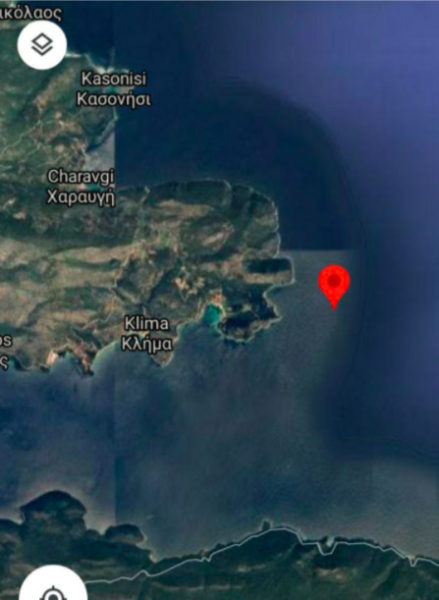The respondent is a 27-year-old man from Iraq. He has experienced three pushbacks, this report details his most recent.
On Tuesday, August 24th, the respondent explained that he, together with a group of 37 people from Iraq, Palestine, and Somalia, travelled on a small plastic boat from Kuşadası, Turkey, towards Samos Island, Greece. The majority of the people on the boat were women, five of whom were pregnant. The group also included seven minors and four small children, the youngest of whom was one year old with the oldest person on board reported to be approximately 45 years old.
According to the respondent, the boat departed at approximately 3 AM. After an estimated two and a half hours in the boat, at roughly 5.30 AM and three kilometres from Samos Island, the group was apprehended by a bigger boat. The vessel was described as a medium-sized grey and white boat with no signs, just numbers. They were reportedly apprehended by seven officers, all men, described as wearing dark blue uniforms bearing the flag of the European Union (the respondent noted a blue flag with stars on it). All of them wore black balaclavas covering their heads. Some of the officers reportedly spoke English and some of them spoke Greek plus other languages that the respondent could not understand.
According to the respondent, the officers took the motor that was connected to the plastic boat and threw it into the water and then attached a cable to their vessel so they could tow the plastic boat. Following this, all 37 people were ordered to board the officer’s vessel. The officers were reportedly speaking to them in an insulting and abusive manner, continuously using the Greek word ‘malaka’ (meaning asshole) towards them. “They insulted our mothers, our families and used no good words against us”.
No fingerprints or pictures of the individuals were taken at any time but there was reportedly one picture of the entire group of 37 taken. The respondent said he personally expressed his intention to apply for asylum in Greece but was met only with insults and screams by the officers. “Every time we tried to talk to them, they insulted us and screamed at us”.
According to the respondent, shortly after boarding the boat, the men were forcibly undressed and their money was confiscated. Naked, one by one, they were searched by the officers while being verbally insulted and violently beaten. The officers were reportedly also harassing women and touching their bodies. They did not force the women to undress but reportedly ordered them to stand up and then [the officers] reportedly touched their bodies. The respondent recalled that some of the women were screaming while their bodies were touched and that the officers would beat them and tell them to stop screaming.
The respondent said he was subjected to violent treatment, both physically and mentally, by one of the officers. The officer started kicking and hitting his head, legs, stomach, and back. He was threatening him, holding one hand strongly around his neck and one knife in front of his face, asking who the driver of the boat was. The respondent replied that he did not know who the driver was, but the officer kept threatening him. Although he did not stab him with the knife, the respondent felt really frightened by the danger that was in front of him.
The officers were reportedly using their hands and their legs to hit, beat and kick the people on the boat. Almost everyone was subject to physical violence, except for the minors, with one boy reportedly hiding his phone between his legs.
According to the respondent, the group of people were held on the boat for what felt like one hour. After, they were given orange-coloured life vests. The officers also reportedly inflated one orange and black life raft and threw it into the sea. Several of the people were again violently beaten before they were all forced into the life raft. From there, they were pushed back to the Turkish side.

Location of the apprehension in the Aegean Sea.
Picture sent by the respondent.
After a while in the water and reaching closer to Turkish land, one man decided to jump off the boat and began to swim. The respondent explained that he did not want to go back to Turkey – he wanted to go to Greece. The respondent still does not know what happened to his friend or where he is now.
The transit group was floating on the liferaft for one and a half hours before the Turkish Coast Guard arrived. Their boat was described as being white and orange with the Turkish flag on it. The officers on board reportedly wore red uniforms with the Turkish flag on them. The Turkish Coast Guard first took the women and children into their boat, then the men, and brought them to the Turkish land, the respondent recalled.
The respondent explained that they were taken to the same city they first travelled from, Kuşadası. They were given food and water before they were taken to the police station. The respondent could not recall the exact name of the station, though he described it as a place where people are detained after being pushed back, called ‘yabanji’–meaning “foreign”. This was likely a detention centre for foreigners or a migrant detention facility. Here, their fingerprints were collected.
He said that they had spent 17 hours in detention before they were released.
